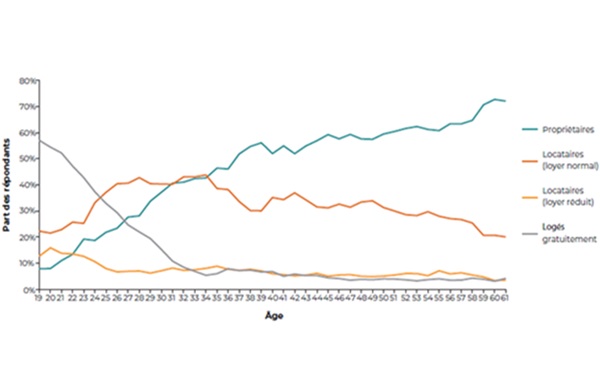 Occupancy status by age group (share of respondents for the entire country); the curves correspond to the rolling average of the rate of respondents occupying a given status over five years;
Credit: “Affordable housing” survey, 2023/ MLogat
Occupancy status by age group (share of respondents for the entire country); the curves correspond to the rolling average of the rate of respondents occupying a given status over five years;
Credit: “Affordable housing” survey, 2023/ MLogat
On Thursday 26 September 2024, Luxembourg's Housing Observatory published a note on the situation of young adults in the Luxembourg housing market.
The conditions of access to housing play an essential role in entering adulthood, the report acknowledged, noting that it is increasingly difficult for young adults to enter the housing market in so-called "tense" contexts. Typically urban areas that concentrate higher education institutions, employment opportunities, amenities and opportunities for social interactions make it difficult to access private property or find affordable housing. These problems push young adults to stay in the family home longer or to rent (shared) housing on the private market. Given these overall developments, this note presented an analysis of the situation of young adults (nineteen to 35 years old) in the Luxembourg housing market, subject to a housing crisis that is having a profound impact on residents.
This note is based on data from the "affordable housing" survey carried out by the Housing Observatory in 2023 for respondents aged nineteen to 35 (32% of respondents - sampling of administrative households), representative in terms of household composition, occupation status and professional status. The study focused on three aspects of the housing situation of young adults: the evolution of occupation status according to age, the satisfaction of young tenants and their lack of residential prospects and the inequalities in access to private property among young adults.
The stages of entry into the housing market, through the evolution of occupation status according to age is pictured above. The age at which owners become the majority varies, however, depending on whether one lives in an urban or rural area and is particularly advanced in Luxembourg City (between 44 and 50 years old). This result reflects the increasing difficulties for young people to find affordable housing and become owners, or even rent housing independently (40% of nineteen to 27-year-olds housed free of charge say they are employed), in urban areas.
The analysis of young people's situation in the private rental market revealed significant challenges. 60% of young tenants expressed dissatisfaction with their rental conditions, especially those paying standard rent. Many face a lack of residential prospects, and/or are unable to move due to financial constraints. Additionally, a significant proportion of young adults bear a high gross effort rate, with more than one-third of those considered in the study spending a substantial portion of their income on rent. These financial pressures shape their housing decisions, leading to higher rates of shared accommodation (59% of those living in shared housing are young people) and a growing desire to move outside Luxembourg.
The inequalities in access to private property among young adults are manifested through mechanisms such as inheritance, financial support from relatives (a third of young people benefit from it when purchasing a property), or migratory background. For example, the proportion of owners among young people of Luxembourg nationality with at least one parent born in Luxembourg is 45% compared to only 7% for those with a nationality outside the European Union and parents born abroad.
Given these findings, Luxembourg's Housing Observatory added it “might be relevant to create targeted aid in addition to the wide range of housing aid available in Luxembourg, from which young adults may be indirectly excluded, given their particular situation of entry into the housing and labour markets”. While targeted aid exists in Luxembourg's neighbouring countries, their potential transferability must take into account the specificities of the Luxembourg housing policy system. Such aids concern support for young people's access to private property, individual aid for specific age groups or the (co-)production of affordable housing for students and/or young workers, the note emphasised.
The findings in this note reportedly raised new questions about the housing trajectories and aspirations of young adults in relation to their professional careers. They also highlighted the challenges young adults face in different parts of the housing market and their ability to move. This included issues such as exclusion, social inequalities and the impact of cross-border housing dynamics, which is part of ongoing research.








